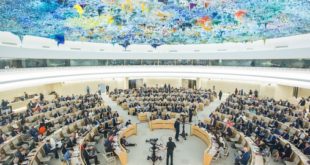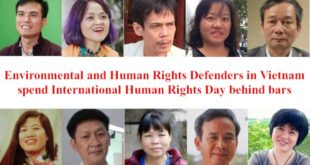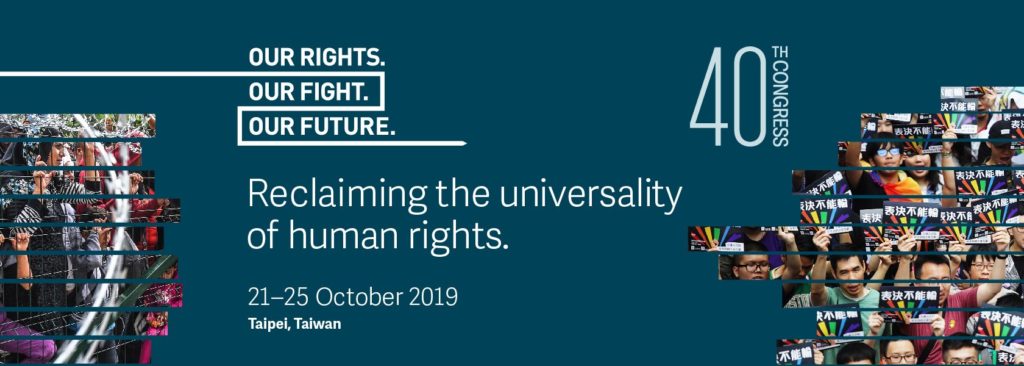
TAIPEI (TAIWAN), 25 October 2019 (VCHR) – More than 400 human rights leaders, academics and civil society representatives from all over the world gathered in Taipei (Taiwan) for the 40th Congress of the FIDH (International Federation of Human Rights) from 21 to 25 October 2019 on the theme of “Reclaiming the Universality of Human Rights”. This is the first time in its history that the FIDH, a global human rights movement headquartered in Paris, has held its Congress in Asia. The event was opened by the President of Taiwan, Tsai Ing-wen, who expressed her firm support for human rights defenders worldwide.
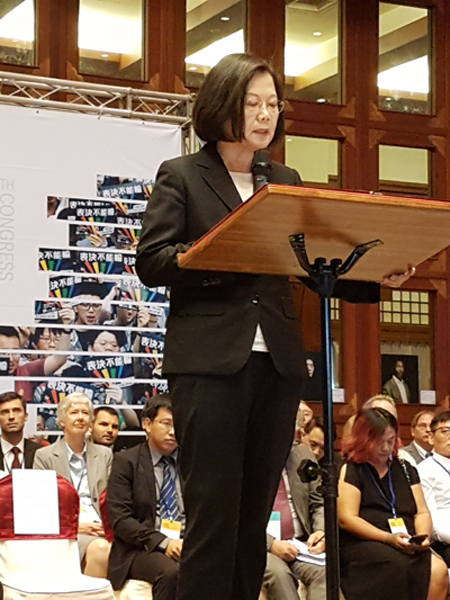
Mr. Võ Trần Nhật, representing the Vietnam Committee on Human Rights (VCHR), a member league of the FIDH, alerted the Congress to the escalating repression against bloggers, human rights defenders and civil society activists in Vietnam, and tabled an “Urgent Resolution on the Situation of Human Rights in Vietnam”, which was unanimously adopted by the FIDH leagues.
The Resolution expressed concern on rising tension in the territorial conflict in the South China sea following recent incursions by China which “threatens peace in the region and beyond” and has sparked off deep indignation in Vietnam. It denounced the Vietnamese government’s systematic suppression of all criticism and peaceful protests on this and other human rights issues, with a surge in arrests and lengthy prison sentences of civil society activists, criminalization of free expression by restrictive legislation and an overall policy aimed to “create a climate of fear amongst all those seeking to participate in public affairs”. The FIDH called on the European Union not to sign the EU-Vietnam Free Trade Agreement (EVFTA) unless it contained independent monitoring and complaint mechanisms to effectively guarantee the Vietnamese people’s fundamental rights (full text below).
“This Resolution is deeply meaningful for human rights defenders in Vietnam” said Võ Trần Nhật. “Whilst the government deploys its vast machinery of repression, censorship, intimidation and imprisonment to suppress their voices, this statement shows that international civil society stands with them in their struggle, and will not be silenced”, he said.
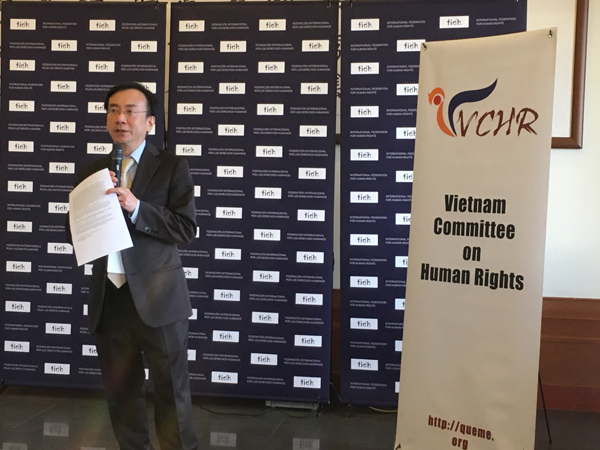
A resolution on “Environmental Justice in Vietnam” tabled by the Taiwan Association for Human Rights (TAHR), was also adopted unanimously by FIDH. Recalling the disastrous marine pollution caused by the Taiwanese Formosa Steel Corporation in Central Vietnam in 2016, it deplored Vietnam’s lack of action to support the victims and address serious human rights concerns including “the right to a clean environment, the right to food and health, the right to work, the rights to freedom of expression, assembly, the right to information and the right to an effective remedy”.
Regretting that a transnational lawsuit submitted by 7,785 Vietnamese victims against the Formosa Plastics group at the Taipei District Court in June 2019 was rejected on 5th October on the grounds that Taiwan lacked jurisdiction over the case, FIDH members called on Taiwan to review the case on appeal, and urged Vietnam to allow a transparent and independent investigation into the disaster, punish those responsible and guarantee adequate compensation to the victims.
During the 5-day conference, participants discussed strategies to strengthen human rights protection at this critical time when the universality of human rights is increasingly compromised in countries all over the world.
The FIDH was founded in 1922 and has 184 affiliated leagues in 112 countries across the five continents. It holds a Congress every three years to examine new challenges facing human rights promotion, define strategies and elect a new leadership for the coming next three-year term. FIDH’s has a long history of supporting human rights defenders in Vietnam. In the 1920s, it succeeded in abrogating the prison sentences of two renowned Vietnamese patriots, Phan Bội Châu and Phan Chu Trinh.
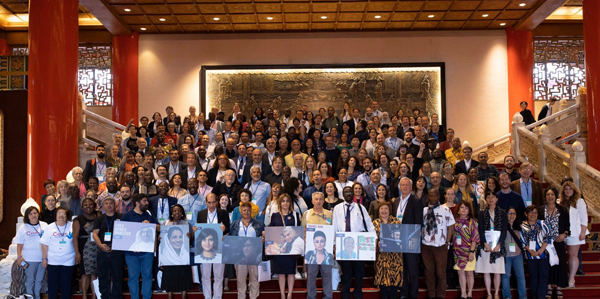
Full text of the Resolution:
Resolution on the situation of Human Rights in Vietnam
The FIDH and its member leagues, gathered at its 40th Congress in Taipei, Taiwan,
Considering thatthe territorial conflict in the South China Sea (known by Vietnamese as the East Sea), which involves Brunei, China, Indonesia, Malaysia, the Philippines, Taiwan and Vietnam, has become increasingly tense following aggressive initiatives by the People’s Republic of China, including incursions, militarisation and unilateral occupation of disputed islands and reefs, and attacks on Vietnamese fishermen ;
Whereas, given the position and strategic importance of this waterway, through which transits over one third of international maritime trade, this issue threatens peace in the region and beyond;
Whereas the incursion of the Chinese ship Haiyang Dizhi 8 and escort ships in July 2019 to Vanguard Bank in the Spratly Islands within Vietnam’s Exclusive Economic Zone sparked off deep indignation, yet the Vietnamese people were unable to express their protests; two small demonstrations held outside the Chinese Embassy in Hanoi on 6 August 2019 and the Chinese Consulate in Saigon on 10 August 2019 were rapidly disbanded by the authorities;
Whereas the Vietnamese population and civil society have been prevented from expressing their protests because of a fierce crackdown by the authorities; the number of prisoners of conscience in Vietnam rose by one third over the past year (now over 130 prisoners) and peaceful demonstrations have been systematically repressed; arrests and harsh prison sentences against those who dare speak out are taking place at this very moment ;
Whereas, in order to stifle the voices of civil society, the Communist Party of Vietnam is increasingly invoking Article 109 of the Criminal Code on “activities aimed at overthrowing the government”, which carries the death penalty as maximum sentence, as well as other “national security” offences to sanction the peaceful exercise of freedom of expression ;
Denounce the use of vague and broadly-defined laws that criminalize the Vietnamese people’s exercise of their fundamental rights and endow the authorities with exorbitant, arbitrary powers to repress human rights defenders and all those seeking to enjoy these rights;
Regret that at its third Universal Periodic Review Vietnam once again rejected recommendations to amend provisions on “national security” in the 2015 Criminal Code to bring them into line with international norms;
Denounce the Vietnamese government’s policy of censorship and clamp-down on information, and its use of diverse forms of repression (police brutality and harassments, unfair trials, restrictive legislation) to create a climate of fear amongst all those seeking to participate in public affairs;
Call upon Vietnam to cease this ongoing crackdown and immediately and unconditionally release all persons detained for the legitimate and peaceful exercise of their fundamental freedoms and rights;
Calls upon the European Union not to sign the EU-Vietnam Free Trade Agreement (EVFTA) until it ensures the agreement guarantees the Vietnamese people’s fundamental rights, notably by including independent monitoring and complaint mechanisms, and to insist that Vietnam upholds its binding human rights obligations.
This post is also available in: French Vietnamese
 Quê Me Quê Me: Action for democracy in Vietnam & Vietnam Committee on Human Rights
Quê Me Quê Me: Action for democracy in Vietnam & Vietnam Committee on Human Rights



